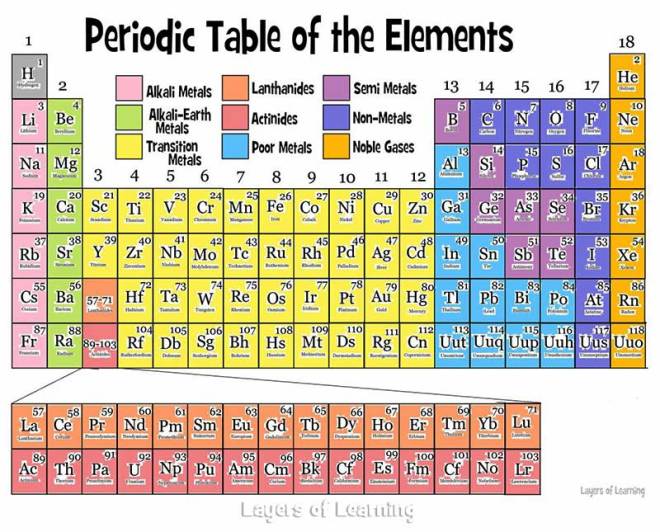Family Names For Periodic Table - the ultimate guide to impressing your science teacher and confusing your classmates. With the help of these hilarious visuals, you'll never forget which element is in which family again.
Periodic Table Timeline
The "Cool Kids" of the Periodic Table

First up, we have the "cool kids" of the periodic table. This family includes all the noble gases, which are totally unreactive and don't like to hang out with the other elements. They're like the aloof teenagers of the periodic table, always chilling by themselves and refusing to engage with the drama of chemical reactions. So if you don't want to get caught up in the chaos of science experiments, just stick with the noble gases.
But if you're feeling a little more adventurous, maybe you want to hang out with the halogens. These guys are like the bullies of the periodic table - they're super reactive and always looking to pick a fight with other elements. Fluorine, for example, is so reactive that it will even react with glass. So if you want to feel tough and badass, just join the halogens and start some chemical drama.
Periodic properties of the elements
The "Popular Kids" of the Periodic Table
If you want to be part of the "popular kids" crowd of the periodic table, look no further than the alkali metals. These guys are super reactive and love to give away their outermost electron, making them great for creating powerful chemical reactions. Just be careful, because some of them are literally explosive - sodium, for example, will react violently with water.
But if you want to really impress your science teacher, you should aim for the transition metals. These elements have some seriously cool properties, like their colorful compounds and their ability to conduct electricity. They're like the overachievers of the periodic table, always pushing the boundaries of what's possible in chemistry. Plus, they're super important for everything from electronics to medicine, so you'll look pretty smart if you can name a few of them.
periodic-table-families-colored- - Dynamic Periodic Table of Elements
The "Weird Kids" of the Periodic Table

Finally, we have the "weird kids" of the periodic table - the rare earth metals. These guys are kind of like the misfits of the group, with their strange electron configurations and their unique chemical properties. But despite their oddities, they're actually super useful for things like magnets, lasers, and even cancer treatments. So if you want to be the quirky, offbeat element of the periodic table, just join the rare earth metals.
Periodic table-families
The "Black Sheep" of the Periodic Table

And finally, we have the black sheep of the periodic table - the lanthanides and actinides. These guys are notorious for being super unstable and radioactive, which is why you won't find them on most periodic tables. But despite their dangerous reputations, they're actually super important for things like nuclear power and space exploration, so they deserve a little love too. Just be careful not to get too close, or you might end up glowing in the dark.
Family Definition - Chemistry Glossary
The "All-Around Good Guys" of the Periodic Table
/periodic-table-165930186-590f2d703df78c92832fe141.jpg)
So there you have it, folks - the families of the periodic table in all their quirky, nerdy glory. Whether you're a cool kid or a weird kid, an overachiever or a black sheep, there's an element for everyone in this crazy world of chemistry. So go forth, my fellow scientists, and explore the wonders of the periodic table. Who knows what kind of chemical reactions you might discover?
Tips:
- Read up on the history and background of the elements to understand their properties better.
- Remember that each element has unique properties that make it different from the others.
- Use mnemonics or memory devices to remember the families and their characteristics.
- Be careful when handling certain elements, especially the reactive ones.
Ideas:
- Create a fun periodic table game to test your knowledge of the elements.
- Organize a periodic table scavenger hunt to learn more about the families and their properties.
- Create your own periodic table with pictures and descriptions of each element.
- Start a science club or group with your friends to explore the world of chemistry together.
How-to:
- Use online resources like Khan Academy or Crash Course to brush up on your chemistry skills.
- Invest in a molecular model kit to better understand the structures of different molecules and compounds.
- Participate in science fairs or competitions to showcase your knowledge and creativity.
- Subscribe to scientific journals or magazines to stay up-to-date on the latest discoveries.
So what are you waiting for? Get out there and become a chemistry superstar with your new knowledge of the periodic table families. Who knows, maybe one day you'll even discover the next breakthrough in chemical science. Now wouldn't that be cool?
Read more articles about Family Names For Periodic Table
